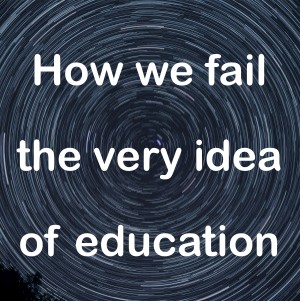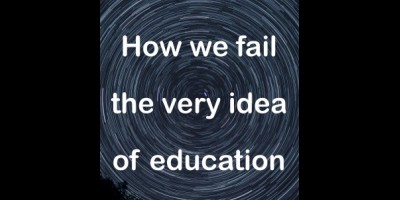Our inattention to the meaning of “education”
 Little attention is paid to the meaning of education, even by professionals. The price we pay is huge. It means, quite simply, that most of the time, we don’t know what we are doing. Disappointment at the results of our efforts is inevitable, and issues that education could address come to seem intractable social problems. Worse, It is quite likely that we are are indoctrinating without knowing it Little attention is paid to the meaning of education, even by professionals. The price we pay is huge. It means, quite simply, that most of the time, we don’t know what we are doing. Disappointment at the results of our efforts is inevitable, and issues that education could address come to seem intractable social problems. Worse, It is quite likely that we are are indoctrinating without knowing it |
Many years ago, I recall a candidate for a position presenting a paper in the department of a leading graduate programme in education. Her research was about some aspect of conventional schooling, but the graduate students kept asking her what it was about her research that made it “educational” research at all. What was it about her research that made it a contribution to the practice or understanding of education? The candidate was clearly frustrated by the question. She could not even grasp its meaning.
Today, I don’t merely wonder how many “educational researchers” would grasp such a question, let alone perceive its importance, I wonder if there are many in the “education” industry capable of asking it, let alone pressing it.
Yet there is very little (if anything) about schooling that ensures that schooling must be used for good ends. Just as an axe is better for chopping than sawing, and we can design different axes for different kinds of chopping, there are limits to the ends that the school can be used for as a means for managing learning and experience. Because of this, too, the school cannot fulfil all aspects of the educational purpose, even if they were serious about education. Education isn’t all about chopping.
But there is nothing intrinsic to the creation of a school that ensures that it has anything to do with education in any case, and it has frequently, and very clearly, been devoted to indoctrination instead. Many of the agendas that seem like good ideas, even today, are simply indoctrination to anyone with a real grasp of the education/indoctrination distinction.
We are all too eager to think that it is quite acceptable to mould people to be what we think people should be, devoting their lives to causes that we understand as noble and good, inflicting our own perceptions of good living upon them. On such a basis, of course, other people would be free to inflict their quite different ideas of good living – and the causes they think equally noble – on the vulnerable young. We might be tempted to think of such other people as indoctrinating, unless they agree with us, but indoctrination should not just be a verbal weapon that we use against others. It should be a refined tool to use against friend and foe alike. In either case, education shouldn’t be about us and our outlook on life when it comes to guiding the learning of others. Yet from the first thoughts of curriculum design right down to everyday application, this is what it is, all too commonly.
Few “educators” were provided with much help in answering the question “what is education?” in their training, let alone the tools to do much of an analysis for themselves, and of course this is like giving permission to ignore the question entirely. “If it mattered, they would have told us” is a very common, but largely subliminal understanding widely embraced as a consequence of conventional schooling. Yet “what is education?” is the central question that must be asked, and properly answered, by anyone who would pretend to “educate”.
This idea can be taken a step further. Is education studied in schools at all, let alone critically? How can we expect students to take charge of their own lives if it isn’t? What does “learning how to learn” amount to, if that isn’t ruled by educational principle? Is education too unimportant to study in schools? “If it mattered, they would have told us”.
So we don’t address it in schools, and then we despair of politicians and parents, and business people, because they don’t understand education. But perhaps the real reason we dare not do it is because we know that, if it was looked at too closely, it might undermine the legitimacy of what we actually do. Our authority might be called into question. So we decide they are “too immature” to grasp it. It would, for them, be dangerous knowledge. What would make them mature enough? When would they have that maturity? We really need to confront ourselves over this, if it is the case!
Of course, on those brief excursions into the issue, even on the rare experience of a whole course that some few of us might have in our training, it is not enough simply to experience a survey of what “educational thinkers” have said, even if the presentation is critical. We each need to develop the idea of education as a real and sophisticated tool that we can use. And one of the best tests, I think, is the power it should have to enable us to understand ourselves, critically, and take charge of our own experience, and our own lives.
More on indoctrination can be found at An introduction to indoctrination


